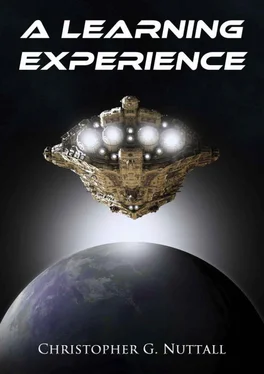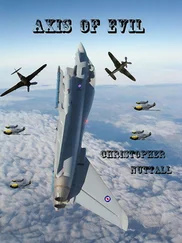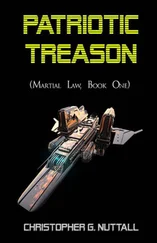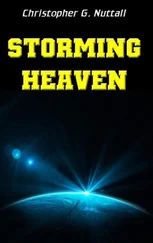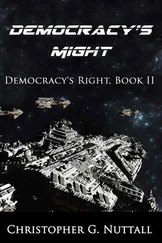“I thought he would have been treated for alcoholism,” he said, sharply. “Did he evade the tests somehow?”
“No,” Rochester said. “But while we handled the physical need for alcohol, we didn’t — we couldn’t — handle the mental addiction to drink. It’s possible that even one sip of moonshine or rotgut tipped him back over the edge.”
“We will need to be more careful with our screening tests in future,” Steve said, darkly. “For the moment…”
He turned back to Jean. “What would you advise we do with him?”
Jean met his eyes. “Right now, we have a legal code that is largely untested,” she said. “And we really need to make it clear that we are not engaging in arbitrary punishment, no matter how deserved. We can’t use his fists any longer.”
Rochester clenched the fists in question. “This isn’t one miner beating the shit out of another miner,” he said. “Nor is this a fight that broke out over gambling. This is this… asshole deliberately beating his wife and daughter, without any cause I care to recognise. There is no bloody way this can be excused.”
He looked at Steve. “Give me five minutes alone with him, please.”
Steve was tempted. He was very tempted. Mariko would not have allowed him to lay a hand on her, not unless she wanted it. And his partner would be furious with him if he allowed the man to escape without punishment. A savage beating might teach him a lesson. But, at the same time, Jean was right. They needed to test their legal code.
“Select a jury,” he ordered, finally. There wouldn’t be any lawyers; someone would have to speak with Witherspoon, then explain his rights under the legal code. “Make sure they’re people who don’t know him personally, if possible. Let them be unbiased.”
“Show them the images and there won’t be a single unbiased person in the colony,” Jean muttered. “The girls were quite badly battered, sir.”
“I know,” Steve said. “I know.”
In the end, he ended up explaining Witherspoon’s rights himself. The man seemed torn between repentance and a cold self-satisfaction that sent chills running down Steve’s spine, something that he was tempted to mention when the jury finally assembled. Pushing his feelings aside, he explained that Witherspoon could either admit to the charges or deny them and present a countervailing argument of his own. The jury would either accept his arguments or find him guilty. If the latter, they would also devise their own punishment.
“But I didn’t mean to do it,” Witherspoon whined, when Steve had finished. “Really, I didn’t mean to do it.”
“Then I suggest you tell that to the jury,” Steve said. “They’re the ones who will decide your fate.”
He had never been fond of lawyers — viewing them as a plague on mankind — but he was starting to realise they might serve a useful purpose. Someone would have to be appointed as the Public Defender, to advise suspects of their rights under the law and assist them in producing their defence. Someone else would have to sum up the case for the jury… no, that someone might wind up leading the jury one way or the other. And there would have to be someone to present the case against the suspect.
The jury assembled in the largest available chamber in the colony, a room that had once served as a dining hall and then turned into a storeroom for supplies brought from Earth. A handful of colonists, including three lunar bloggers, took seats where they could see everything, then Witherspoon himself was brought into the court in handcuffs. Jean, who would be presenting the case for the prosecution, had pointed out that she really needed extra staff or a dedicated prosecutor. Steve had to admit she had a point, although it would raise problems of its own. What would happen when the prosecutor found winning more important than justice?
“The charges facing Daniel Witherspoon are serious,” Jean said. “The previous night, Witherspoon drank heavily, then went home to his chambers. There, he fought with his wife, which ended with him beating her quite heavily. When his daughter attempted to intervene, she was beaten too. Both women are currently in the medical bay.”
Witherspoon looked reluctant to speak when it was his turn. Indeed, he hadn’t even attempted to suggest if he would be pleading innocent or guilty. Steve rolled his eyes, then waited, as patiently as he could, for the man to present his defence. He had hours, if necessary. There would be no attempt to cut his defence short.
“I was drunk,” he said, finally. “I did not mean to hurt either my wife or my daughter.”
Jean rose to her feet. “You inflicted no permanent harm,” she said. “That implies, very strongly, that you were in perfect control of yourself.”
She showed the jury images taken by the doctor. “As you can see, the bruises look very bad,” she continued. “But they would have faded, naturally, over the coming week if they hadn’t been treated already. There would have been no permanent physical harm. But the scars you inflicted on their minds will never heal.”
Witherspoon offered no defence. Eventually, the jury withdrew to a secure room to debate Witherspoon’s fate. Steve watched them go, wondering if he was doing the right thing. A word from him could have condemned Witherspoon to death, or return to Earth, or a lifetime of hard labour. What if the jury took the view that no permanent harm wasn’t as bad as something that did cause permanent harm? Or felt that they’d heard too much about mental harm from courtrooms down on Earth? It was so hard to prove that anyone had really suffered mental problems or depression from anything.
The jury returned, fifty minutes later.
“It is a principle of lunar law,” the foreperson said, “that a person is responsible for their own actions. If they should happen to be under the influence of drugs or alcohol, they are still responsible for themselves as they chose to enter a state of diminished rationality. As such, your attack on your wife and daughter was your responsibility.
“Furthermore, you have presented no excuse for your actions, no suggestion that they might somehow have been justified. Accordingly, we find you guilty of the charges brought against you.”
There was a long pause. “We debated sentencing for quite some time,” the foreperson continued. “Some of us felt you did not deserve to live, or that there was a strong possibility that you would reoffend. Others felt you simply did not deserve to live here. However, we have decided that you will spend four years at hard labour instead, assuming you wish to remain on the moon. If not, you may return to Earth.”
Steve wondered, absently, if Earth would take him. Witherspoon was an American citizen, technically, but the precise legal status of the lunar colonists was somewhat vague. It was arguable that they held joint citizenships, yet it was uncertain how it would all play out. As Kevin had said, it might be better if they all renounced their American citizenships. But Steve hadn’t been able to bring himself to do that, not really. He still clung to the ideal of America in his heart.
Witherspoon, after being told that he had a day to decide, was marched out of the room and back to the cells. Steve sighed, then walked over to the bloggers, most of whom were just finishing their articles. As the first trial on the moon, it would set precedent for the future… although Steve had no intention of allowing precedent to rule unchallenged. The jury would always have the final word on just what happened to suspects.
“Mr. Stuart,” Gunter Dawlish called. He’d moved to the moon, a decision that had boosted his popularity on Earth. “Do you have any comment on the case?”
Читать дальше
